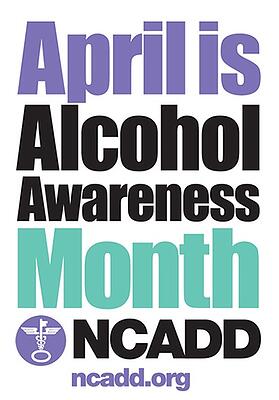Reducing the stigma associated with alcohol use disorder, the National Council on Alcoholism & Drug Dependence (NCADD), founded and sponsored Alcohol Awareness Month. By encouraging communities to talk about alcohol, alcoholism and recovery we can better prevent, identify, and treat substance use disorders as well as support those in our communities who are affected by them.
Addiction Awareness Month
2018’s Alcohol Awareness Month aims to educate people about the treatment and prevention of alcoholism, particularly among the youth, and the important role that parents can play in giving kids a better understanding of the impact that alcohol can have on their lives.
The two main areas of focus for Alcohol Awareness month this year are:
- Increasing public awareness and understanding of alcoholism and reducing the stigma connected to this diagnosis.
- Underage drinking.

The Year’s Theme
The 2018 theme “Changing Attitudes: It’s not a ‘rite of passage'” is designed to draw attention to the many opportunities individuals, families, and communities have to educate young people on the dangers of alcohol use. We often forgive or encourage underage drinking as a “rite of passage” but should challenge this notion of alcohol use as a part of young adulthood. Instead of sitting back and hoping kids will “get through it,” we can change our attitude and take an active role in educating about the risks of drug and alcohol use in adolescence, young adulthood and throughout life.
Youths & Underage Drinking
Centers for Disease Control and Prevention (CDC) reported that alcohol is the most commonly used and abused drug among youth in the United States. Although drinking by persons under the age of 21 is illegal, people aged 12 to 20 years drink 11% of all alcohol consumed in the United States.
Adolescence is a time of change and growth, including behavior changes. These changes usually are a normal part of growing up but sometimes can point to an alcohol problem. Parents and teachers should pay close attention to the following warning signs that may indicate underage drinking:
- Changes in mood, including anger and irritability
- Academic and/or behavioral problems in school
- Rebelliousness
- Changing groups of friends
- Low energy level
- Less interest in activities and/or care in appearance
- Finding alcohol among a young person’s things
- Smelling alcohol on a young person’s breath
- Problems concentrating and/or remembering
- Slurred speech
- Coordination problems
Reach Out To Addiction Recovery Specialists
Let’s join hands and raise Alcohol Awareness this Month. It’s an opportunity to increase understanding about alcohol use disorder, its causes, effects, treatment, and recovery.
If you are concerned about a friend, family member, co-worker or your own drinking behavior, help is always available. Reach out and talk to an addiction specialist at Aquila Recovery who can help you take the next step to recovery. Contact us by phone at or send in an online consultation request.
